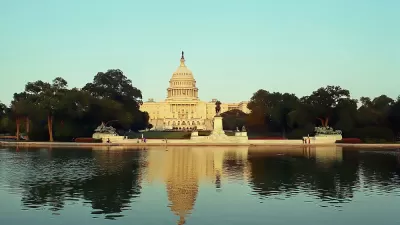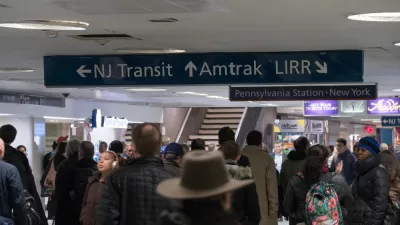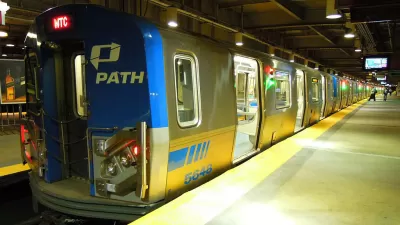Trump's animus towards using federal funds to replace a century-old, hurricane-damaged rail tunnel under the Hudson River is so strong that he warned Congress he will veto a spending bill they must pass by March 23 to keep the government operating.

As posted earlier, President Trump had personally asked House Speaker Paul Ryan to not include any federal funds towards Amtrak's $30 billion Gateway Program which includes about $13 billion for replacing the 108-year-old tunnel under the Hudson River, damaged by Hurricane Sandy in October 2012. The tunnel, consisting of two, single-track, electrified rail tubes, is operating on borrowed time. It provides the only means for New Jersey Transit and Amtrak trains to access New York's Penn Station, the busiest rail hub in North America.
The Washington Post reporters who broke that story suggested Trump was acting to punish New York's senior U.S. senator, Minority Leader Chuck Schumer, for having stalled the confirmation of several of Trump's nominees for his administration, including his pick to head the Federal Railroad Administration.
Now we learn that Trump has clearly raised the stakes in his battle with key Congressional leaders, both Democrats and Republicans, on whether or not to provide omnibus funds for what is considered by many experts to be the nation's most crucial rail project as it is vital to the Northeast Corridor, which has Amtrak's busiest and most profitable routes as well as commuter and freight rail.
"The potential veto was first reported by Politico on Thursday, though sources have cautioned to The Hill that the White House’s move may be more of a pressure tactic," report Melanie Zanona and Mallory Shelbourne for The Hill on March 8.
“The administration has been very clear that we don’t think this is an efficient use of taxpayer dollars,” a senior administration official said in a statement.
Speaker Paul Ryan (R-Wis.) and Senate Majority Leader Mitch McConnell (R-Ky.) want to pass a $1 trillion-plus omnibus spending bill before March 23 when the current funding for the government is exhausted. The bill contains at least $900 million for work on the Hudson Tunnel project.
"While it is highly unusual for a Republican president to threaten a veto on a funding bill coming from a GOP-run Congress — and risking a potential government shutdown — Trump is adamant in his opposition to the federal government underwriting the project, sources said," reports Politico on March 8.
“This is all Trump personally,” said a GOP source on Capitol Hill. “He is not going to go for any Gateway [funding].”
Politico suggests additional explanations for Trump's vendetta against Schumer, such as using the Gateway project to get the minority leader's support for funding the Border Wall.
Hat tip to Mass Transit magazine.
FULL STORY: WH threatens veto of funding bill over NY-NJ rail project

Planetizen Federal Action Tracker
A weekly monitor of how Trump’s orders and actions are impacting planners and planning in America.

Chicago’s Ghost Rails
Just beneath the surface of the modern city lie the remnants of its expansive early 20th-century streetcar system.

San Antonio and Austin are Fusing Into one Massive Megaregion
The region spanning the two central Texas cities is growing fast, posing challenges for local infrastructure and water supplies.

Since Zion's Shuttles Went Electric “The Smog is Gone”
Visitors to Zion National Park can enjoy the canyon via the nation’s first fully electric park shuttle system.

Trump Distributing DOT Safety Funds at 1/10 Rate of Biden
Funds for Safe Streets and other transportation safety and equity programs are being held up by administrative reviews and conflicts with the Trump administration’s priorities.

German Cities Subsidize Taxis for Women Amid Wave of Violence
Free or low-cost taxi rides can help women navigate cities more safely, but critics say the programs don't address the root causes of violence against women.
Urban Design for Planners 1: Software Tools
This six-course series explores essential urban design concepts using open source software and equips planners with the tools they need to participate fully in the urban design process.
Planning for Universal Design
Learn the tools for implementing Universal Design in planning regulations.
planning NEXT
Appalachian Highlands Housing Partners
Mpact (founded as Rail~Volution)
City of Camden Redevelopment Agency
City of Astoria
City of Portland
City of Laramie





























